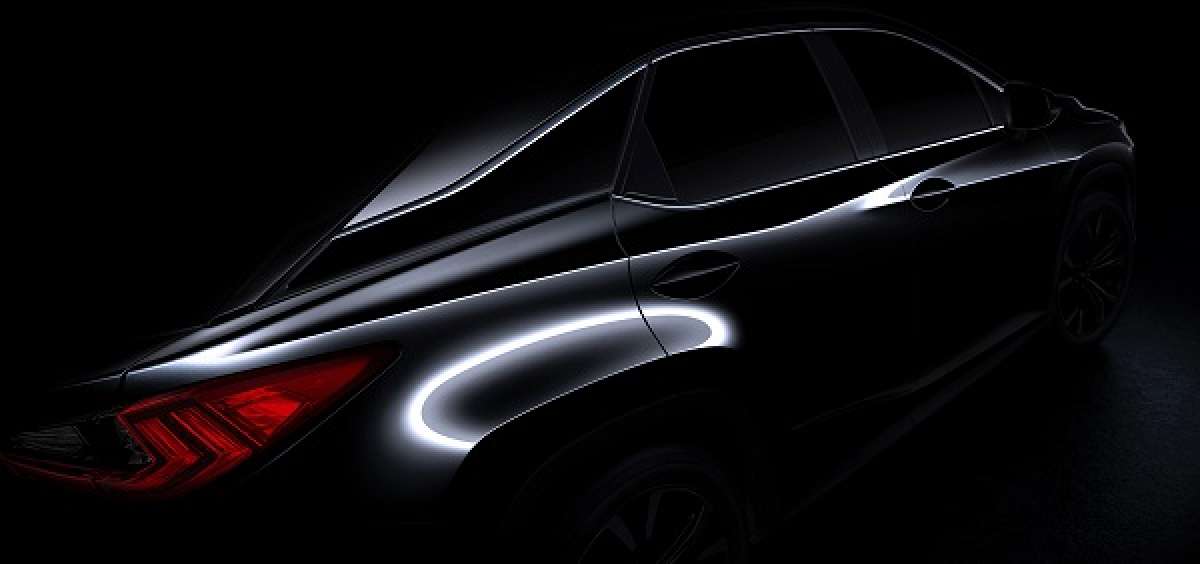The Lexus RX 350 defines its category. The problem is, the category is changing. The current Lexus RX 350 and RX 450h hybrid own the mid-size, 5-passenger premium crossover market. This is a segment that Lexus itself created exactly 17 years ago when Toyota’s Japanese market Harrier was brought to the US as the Lexus RX 300. Since that instant, Lexus’ sales of this vehicle have made it the leader in the segment. The RX and ES sedan combined are really the Lexus brand in terms of profits and sales.
However, now the RX’ segment has changed. One problem is that the Lexus RX grew up. Originally, it was the same size as the new, smaller, Lexus NX 200t. The RX grew progressively larger, which all worked fine. Unfortunately, it never grew a third row, and that is a major problem. Lexus will fix that in 2 weeks. The new RX will have a third row (is our prediction), and it will be longer than the current vehicle. Lexus will use the basic underpinnings of the current Highlander to accomplish this.
Although Lexus might shock us and do something different, we also predict that Lexus will change up the current V6. Look for the new V6 to adopt the Atkinson cycle, or be some sort of Otto/Atkinson combination. This will improve fuel economy and allow Lexus to continue to use its basic 3.5-liter engine design which critics sometimes make fun of, but that dramatically outsells the competitions smaller turbos and larger high-performance engines.
Don’t be surprised if down the road the RX hybrid grows a cord and becomes a plug-in either. It now has plenty of room for extra batteries, and you might be surprised to hear this, but Toyota is the top-seller of plug-in vehicles in the US in terms of sales. Adding a plug-in option to the RX would be a snap for Toyota/Lexus.
Lexus will go forward with the NX, which is selling very well in its first few months, as its 5-passenger offering and the RX will take over as the 7-passenger, three-row vehicle. Yes, Lexus does have other body-on-frame SUVs with three rows, and they barely sell. They will eventually be pared back but not immediately. There are still some buyers that prefer less safety, less fuel efficiency, less comfort, less performance, but the beefier look and imaginary towing advantages that a body-on-frame vehicle offers.
Lexus dealers will rejoice when the new RX arrives. Although it still sells very well, the market segment has expanded dramatically, and Lexus dealers have been losing sales to 3-row premium and luxury crossovers made by competitors. That ends shortly.
Hedging our bets, there is one other possibility for RX and that is it stays a larger 5-passenger and Lexus introduces a new stretched version, possibly called the TX. We will know on Wednesday, April 1st.






Comments
Oh please! Stop this nonsense
Permalink
Oh please! Stop this nonsense. Toyota/Lexus dislike EV, diesel, turbo and plug in. Toyota believes in naturally aspirated Full Hybrids gas/hydrogen. Batteries at 100 lbs weight are already heavy pigs. Toyota already recalls diesels in Europe due to runaway diesel unintented accelerations (replacing ALL TOGETHER turbo's, intercoolers and some valves too - much worse situation than the Lexus ES, SUA back in 2009- actually all diesel cars from all manufacturers are dangerous because of "diesel runaway", yet journalists tend to hide this mess, due to diesel-lobby interests) - and turbo cars are just PR. They are expensive, gas-gazzler, need F1 fuels (lexus-LFA incorporates an F1 engine and is designed to race on 95 RON ), utilize prone to malfunctions expensive systems to deal with after treatment exhaust and not any faster... (autobytel tested both NX at the same place and time and found NX300h to be on par with NX200t performance wise).
Thanks Pauloko for this. I
Permalink
In reply to Oh please! Stop this nonsense by pauloko (not verified)
Thanks Pauloko for this. I don't cover European models normally and I did not know there were bad experiences with diesels in Europe. That may be one more reason why Toyota has never offered one here in the US market and has no plans to. I am one of those journalists that never misses a chance to point out issues with diesel or to dispel the many myths (as you can see from my many stories here at TN on the subject). Cheers,
No I wasn't blaming you. I
Permalink
In reply to Thanks Pauloko for this. I by John Goreham
No I wasn't blaming you. I was talking about journalists in Europe. Diesel runaway is very dangerous, because once oil goes to turbo, then it feeds the engine (diesel engine burns everything). Engine does not need fuel from the tank. Engine becomes autonomous-powered and going WideOpenThrottle(redlines). You cannot stop the engine even if you turn off the key. Most often the problem is DPF filter. From time to time, some manufacturers claim they have fixed the problem, but there is not a certain fix, as of today. Those who govern Europe, the diesel-lobby and their journalists play a very dirty game and the victim is public safety.
I guess Germany is behind this plot because of the greatest motive. They have spent huge amount of money on DI/turbo and diesel and want to gain as much as possible. They even don't bring regular unleaded (87AKI/91RON) in Europe, because Toyota (Germany's greatest enemy) would greatly benefit from the cheap regular unleaded (appropriate for NA port injection engines but not recommended for DI engines). So, people in Europe have no option other than to buy the expensive 91AKI/95RON premium petrol or to buy a diesel car!
I am sorry for the long posts. Keep the good job.